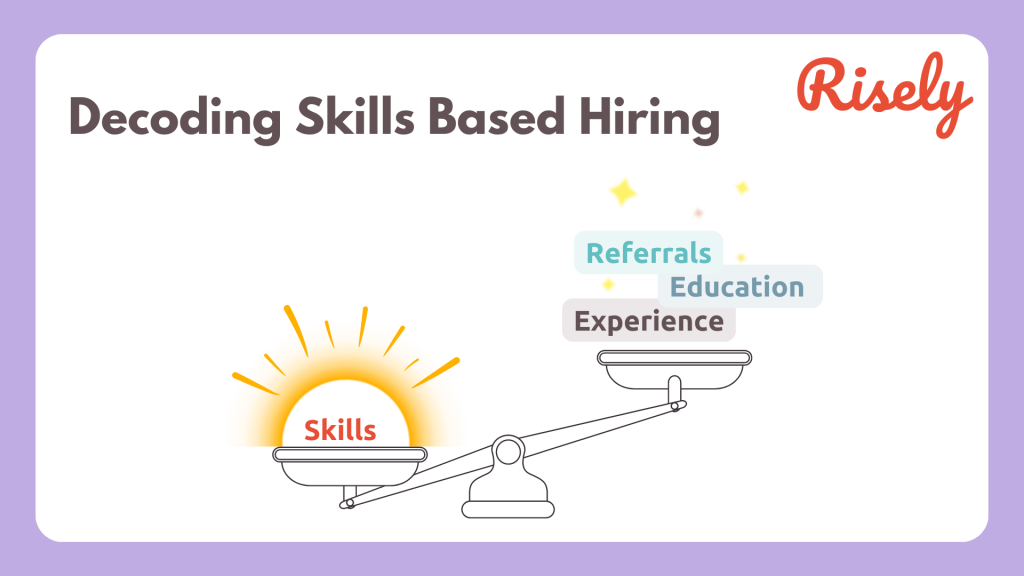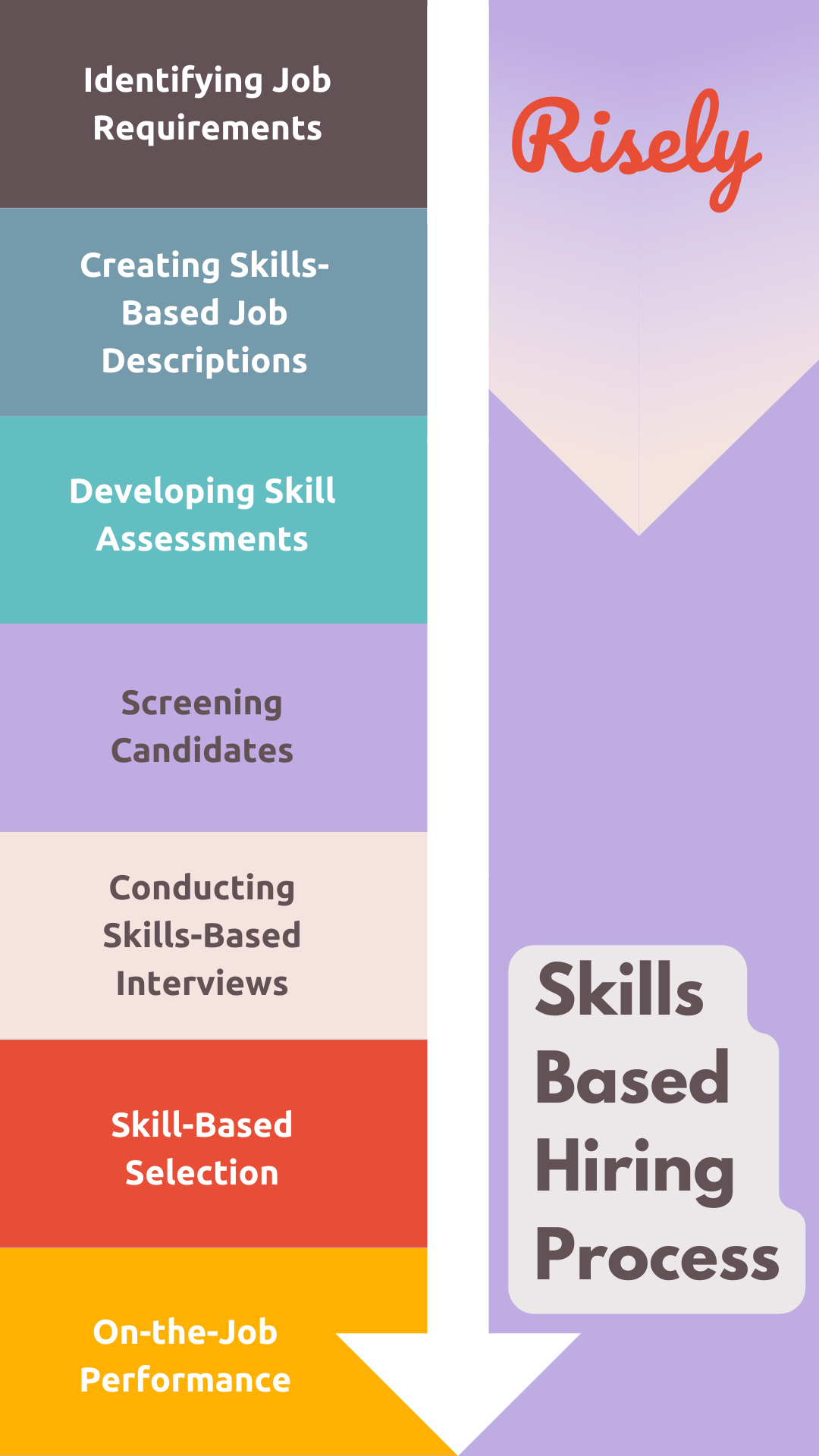Decoding Skills Based Hiring for Smart Managers in 2023
Are you a smart manager looking to stay ahead of the curve in 2023? Then it’s time to decode skills-based hiring. In this blog, we will dive deep into understanding what skills-based hiring is and how it differs from traditional hiring methods. We will explore the rising trend of skills-based hiring and the factors driving its popularity among smart managers like yourself. Discover the advantages of adopting this approach, such as enhancing the quality of your hires and expanding your talent pool. We will also provide practical tips on implementing skills-based hiring, including updating job descriptions and leveraging AI-powered tools. Plus, we’ll discuss the crucial role that L&D professionals play in this process. Get ready to revolutionize your hiring strategy and attract top talent with this new style.What does Skills Based Hiring mean?
Skills-based hiring is a recruitment approach that focuses on evaluating candidates based on their specific skills and abilities rather than traditional qualifications and experience. By doing so, managers can identify candidates with the exact skills needed in a particular job, leading to more effective hiring decisions. This approach also helps reduce bias in the hiring process by focusing on objective criteria rather than subjective factors such as educational background or personal connections. Additionally, skills-based hiring promotes diversity and inclusion by providing equal opportunities for candidates from different backgrounds who may possess the required skills but not traditional qualifications. Watch to learn more:Defining Skills-Based Hiring
Skills-based hiring is a recruitment strategy that prioritizes evaluating candidates based on their specific skills and abilities rather than relying solely on traditional qualifications or experience. This approach aims to match the right candidate with the right job by assessing their proficiency in key job-related skills. It can be particularly effective for positions requiring specific technical or specialized skills, as it ensures managers hire candidates with the necessary capabilities to excel in the role.
The Process of Skills-Based Hiring
Skills-based hiring is a recruitment approach that emphasizes evaluating candidates based on their specific skills and abilities rather than traditional qualifications or experience. This concept recognizes that skills can be developed through various experiences, both formal and informal. The process of skills-based hiring involves:Step 1: Identifying Job Requirements
The hiring team starts by clearly defining the specific skills and qualifications required for the job. They focus on the skills and competencies necessary to perform the tasks and responsibilities effectively. For instance, the skillset for a role in BPO can differ from one in IT.Step 2: Creating Skills-Based Job Descriptions
Instead of relying solely on traditional job descriptions emphasizing experience and education, the hiring team crafts skills-based job descriptions. These descriptions outline the key skills, abilities, and knowledge candidates must possess to excel in the role.Step 3: Developing Skill Assessments
The hiring team creates skill assessments tailored to the job requirements to evaluate candidates objectively. These assessments can include various methods such as written tests, coding challenges, simulations, or practical exercises. The aim is to assess candidates’ abilities rather than relying solely on resumes or interviews.Step 4: Screening Candidates
Candidates submit their applications, including their resumes and cover letters. The hiring team focuses on reviewing candidates’ skills and relevant experience rather than primarily considering factors like educational background or previous job titles. It helps eliminate bias and broaden the pool of potential candidates.Step 5: Conducting Skills-Based Interviews
Shortlisted candidates are invited to skills-based interviews. These interviews primarily focus on evaluating the candidates’ skills, problem-solving abilities, and knowledge relevant to the role. Interviewers may use behavioral questions or present hypothetical scenarios to assess how candidates handle specific situations.Step 6: Skill-Based Selection
Based on the skill assessments and interviews, the hiring team objectively evaluates candidates’ performance. They compare candidates’ skills and qualifications against the predetermined job requirements. The emphasis is on identifying candidates with the necessary skills and potential to thrive in the role.Step 7: On-the-Job Performance
Once selected, the hired candidates can effectively apply their skills from day one. Since they were chosen based on their demonstrated abilities, they have a higher chance of quickly adapting to their roles and contributing to the organization’s success.
The Rising Trend of Skills-Based Hiring in 2023
Traditional hiring practices have long relied on qualifications and experience as the primary markers of candidates’ suitability for a job. However, a rising trend of skills-based hiring looks beyond these factors. Skills-based hiring assesses candidates based on their specific abilities and competencies required for the job, allowing for a more diverse and inclusive workforce. This shift in mindset requires adapting recruitment processes to identify and evaluate relevant skills. Skills-based hiring can improve employee performance, reduce turnover, and increase organizational innovation.Factors Driving Skills-Based Hiring
Factors driving skills-based hiring include the need for a more efficient and effective hiring process, the desire to match candidates with the specific skills required for a job, and the recognition that traditional qualifications may not always accurately reflect an individual’s abilities. Additionally, such hiring practices allow employers to focus on a candidate’s potential and ability to learn and adapt rather than solely relying on their previous experience or education. This approach can lead to greater diversity and inclusion in the workforce by opening up opportunities to individuals with non-traditional backgrounds or who possess transferable skills. Skills-based hiring also aligns with the changing nature of work, as technology and automation continue to reshape industries and create new roles that require specialized skills. By prioritizing skills in the hiring process, organizations can ensure they have a workforce equipped with the necessary capabilities to thrive in today’s rapidly evolving job market.Other Interesting Reads
Why is Skills-Based Hiring Becoming a Go-to Strategy for Smart Managers?
Skills-based hiring is gaining popularity among intelligent managers because it allows them to focus on specific skills and abilities needed for a job. By prioritizing skills over traditional qualifications, managers can find candidates who are a good fit, contribute immediately, promote diversity, and identify high performers with unconventional backgrounds.Distinguishing Features of Skills-Based Hiring
Skills-based hiring stands out for its unique distinguishing features in the realm of talent acquisition. Unlike traditional hiring, this approach places a primary focus on a candidate’s abilities and competencies rather than solely relying on their experience or qualifications. By assessing candidates based on their specific skills, managers can make more efficient and effective hiring decisions that align talent with the business needs. Moreover, skills-based hiring reduces bias and promotes diversity by prioritizing objective assessments of candidates’ capabilities. Clear job descriptions, targeted assessments, and ongoing skill development opportunities are crucial to implement this approach successfully.How is Skills-Based Hiring Different from Traditional Hiring?
Skills-based hiring differs from traditional hiring by focusing on specific job-related skills and competencies rather than qualifications and experience. This approach allows employers to identify candidates with the right skills, even if they lack extensive experience or traditional credentials. Skills-based hiring promotes diversity by giving opportunities to candidates from non-traditional backgrounds who possess the necessary skills.Importance of Verified Skills in Skills-Based Hiring
Verified skills play a crucial role in skills-based hiring, as they provide objective evidence of a candidate’s capabilities. Employers can obtain verified skills through certifications, assessments, or practical demonstrations. These demonstrated skills help employers make more informed hiring decisions by ensuring that candidates possess the necessary competencies for the job. Skills-based hiring focuses on what a candidate can do rather than what they have done in the past, leading to more effective talent acquisition and retention strategies. By emphasizing verified skills, employers can build a workforce with the right skill sets and increase the chances of hiring top talent. Read more: Top 6 Roles of virtual Training Badges for Motivation in digital eraBuilding Effectiveness with Skills-Based Hiring
Adopting skills-based hiring offers several advantages for companies. Firstly, it allows for a more accurate assessment of a candidate’s abilities and potential, ensuring that the right skills match the job requirements. By focusing on skills rather than traditional qualifications, companies can tap into a wider talent pool and attract diverse candidates, promoting a more inclusive and fair recruitment process. Hiring based on skills also leads to higher productivity and job satisfaction, as candidates are better equipped to handle specific job requirements. Moreover, skills-based hiring aligns with the changing nature of work, emphasizing adaptability and continuous learning for success. Read more: A Manager’s Guide to Hiring a Team: 9 Effective TipsEnhancing Quality of Hire with Skills-Based Hiring
Incorporating skills-based hiring practices can significantly enhance the quality of hiring for organizations. This approach focuses on a candidate’s qualifications and abilities, enabling managers to identify individuals with the skills required for success in a particular role. It helps managers avoid candidates who lack the requisite skills even after fulfilling the conventional requirements attached to the position. Instead, they can pick candidates who are sure to match the needs of the role. Furthermore, building teams based on skills results in a more competent and high-performing workforce, ultimately increasing employee satisfaction and retention.Expanding Talent Pool and Enhancing Diversity through Skills-Based Hiring
Skills-based hiring allows managers to focus on the specific abilities and skills required for a job rather than relying solely on traditional qualifications or experience. By expanding the hiring criteria, managers can tap into a larger talent pool and attract candidates from diverse backgrounds. This approach promotes diversity and inclusion within the workforce by removing potential biases that exist in traditional hiring processes. Additionally, skills-based hiring fosters innovation and creativity within teams as individuals with different skill sets bring unique perspectives and ideas. It also provides flexibility in building teams based on specific skills or competencies needed for a project or initiative. Read more: Why Is Diversity Important In Teams? 5 Tips To Build Diverse TeamsHow to Implement Skills-Based Hiring?
To implement skills-based hiring:- Start by identifying the specific skills and competencies required for each role.
- Create job descriptions that highlight these skills instead of generic qualifications.
- Use skills assessments and tests to evaluate candidates’ proficiency during hiring.
- Train hiring managers on how to conduct skills-based interviews effectively.
Updating Job Descriptions for Skills-Based Hiring
To effectively update job descriptions for skills-based hiring, clearly define the specific skills and competencies required for each job role. Use specific language and keywords in the job descriptions to attract candidates with the desired skills. Instead of simply listing qualifications or experience, focus on highlighting the outcomes and results that can be achieved through the required skills. Consider incorporating skill-based assessments or tests into the hiring process to evaluate candidates’ abilities accurately. Collaboration with hiring managers and teams is crucial to ensure alignment on each position’s desired skills and competencies. Additionally, providing training and resources to hiring managers can help them effectively assess and evaluate candidates based on their skills. Read more: 5 Interviewer Skills That Every Manager Needs For Smart HiringStructuring the Interview Process Around Skills
To ensure successful skills-based hiring, it is essential to structure the interview process around the specific skills and competencies required for the job. One way to achieve this is by using behavior-based questions that delve into candidates’ past experiences and how they demonstrate the necessary skills. Practical assessments or work samples can also gauge candidates’ abilities in real-world scenarios. To maintain objectivity, a scoring rubric or evaluation criteria should be created to compare candidates’ skill levels. Additionally, providing training and guidance to interviewers on effectively assessing skills during interviews is crucial.Leveraging AI-Powered Tools for Skills-Based Hiring
In the realm of skills-based hiring, leveraging AI-powered tools can be a game-changer for smart managers. These tools offer a streamlined approach to the hiring process by automating essential tasks like resume screening, skill assessments, and candidate matching. By analyzing resumes and job descriptions, AI algorithms can identify relevant skills and qualifications, ensuring that the right fit is found for open positions. Additionally, these tools can administer online assessments or simulations to evaluate candidates’ technical capabilities or job-specific skills. Using AI-powered tools in skills-based hiring saves time, improves accuracy, and increases diversity by minimizing unconscious bias. Read more: Secret to Culture Setting and Employee Retention starts from OnBoardingConclusion
In conclusion, skills-based hiring is the future of recruiting and talent acquisition. With the rising trend of skills-based hiring in 2023, it’s becoming clear that traditional hiring methods are no longer sufficient in identifying top talent. Smart managers recognize the importance of focusing on verified skills rather than just resumes and qualifications. By implementing skills-based hiring, organizations can enhance the quality of their hires, expand their talent pool, and promote diversity within their teams. To successfully implement skills-based hiring, updating job descriptions to focus on specific skills and structuring the interview process around assessing those skills is crucial. Additionally, leveraging AI-powered tools can streamline the hiring process and ensure an accurate assessment of candidates’ skills. As L&D professionals play a crucial role in developing employees’ skills, they also have an essential role to play in skills-based hiring. By aligning training and development programs with the required skills for various roles, L&D professionals can help organizations find and retain top talent. So, are companies ready to shift to a skills-based approach to hiring? The answer is a resounding yes. With the numerous advantages it offers, including enhanced quality of hire and increased diversity, adopting skills-based hiring is a smart move for any organization looking to stay ahead in today’s competitive job market.Master constructive feedback to lead interviews like a pro manager!
Test your constructive feedback skills for free now with the help of Risely’s assessments for managers and team leaders.
Skills based Hiring FAQs
What is skills based hiring?
Skills-based hiring is an approach where employers focus on evaluating candidates based on their specific skills, abilities, and expertise rather than just their formal qualifications. This method ensures that candidates possess the required competencies for the job, leading to better matches and enhanced job performance.
How to develop skills of employees?
Developing employees’ skills involves providing targeted training programs, mentorship opportunities, and on-the-job experiences to enhance their knowledge and abilities. Encouraging continuous learning, providing constructive feedback, and offering growth opportunities within the organization are key to nurturing employees’ professional development.
Other Related Blogs
Over analyzing things keeps you stagnant.
Over analyzing things keeps you stagnant. Have you ever found yourself reading a sentence again and again without making much sense of it? Or, have you ever looked into options…
Strategic Thinking Training For Leaders Simplified
Strategic Thinking Training For Leaders Simplified Strategic thinking is a vital skill for business leaders, managers, and employees in today’s fast-paced, competitive world. It goes beyond day-to-day tasks and involves…
Marketing Managers: 7 Essential Skills and Growth Guide
Marketing Managers: 7 Essential Skills and Growth Guide What does a marketing manager do? Is it social media management, tracking huge data, or building a brand voice through unique initiatives?…
Manager Effectiveness: A Complete Guide for Managers in 2024
Manager Effectiveness: A Complete Guide for Managers in 2024 Manager effectiveness is everyone’s favorite buzzword. But the road to achieving it is trickier than it looks like! While manager effectiveness…


